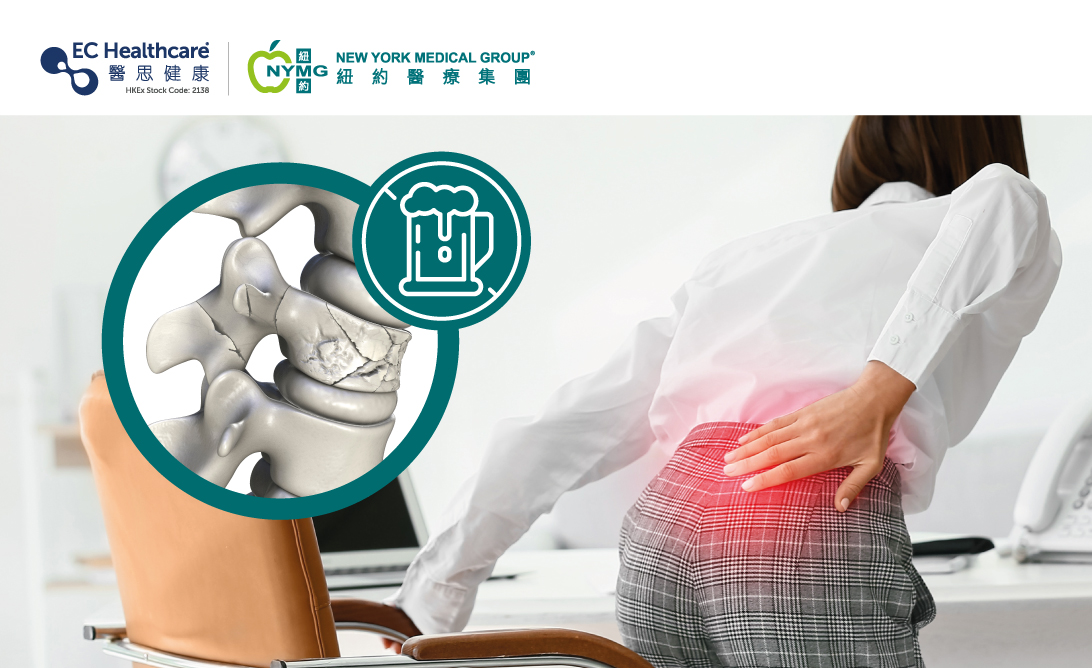Alcohol Abuse Linked to Osteoporosis: Triple the Risk of Fractures


According to a recent health survey released by the Department of Health, over 60% of respondents in Hong Kong reported having a drinking habit, with more than 20% of underage individuals admitting to consuming alcohol. Savoring a drink can be enjoyable, but excessive alcohol consumption can erode bone density, tripling the risk of osteoporosis and fractures. Those who indulge in alcohol should prioritize their health and regulate their alcohol intake.

How Does Alcohol Contribute to Osteoporosis?
Individuals with alcohol abuse tendencies often experience malnutrition, leading to lower levels of minerals and calcium in their bodies compared to the general population. Alcohol intake also raises adrenaline levels, which subsequently increases corticosteroid levels in the skin, negatively impacting bone density. Moreover, alcohol inhibits the absorption of calcium and magnesium, and it generates a substance that erodes bone cells. When the metabolic rate of bone cells fails to keep up with the pace of bone erosion, it results in insufficient bone formation and leads to osteoporosis. Foreign studies have shown that men who consume more than 1.5 glasses of red wine per day have a 50% chance of developing osteoporosis, while postmenopausal women who consume 2.5 cans of beer daily can accelerate bone loss.
Screening for Osteoporosis
In the early stages of osteoporosis, there are no apparent symptoms, but bone loss renders the bones fragile, increasing the risk of fractures threefold compared to the general population. As a result, patients often discover they have the condition only after experiencing a fracture. Individuals who consume alcohol are more prone to imbalance and stumbling, thereby augmenting the risk of falls and fractures. Beyond alcohol consumption, other high-risk factors for osteoporosis include having a family history of the condition, smoking, lack of exercise, and postmenopausal status. It is commonly believed that osteoporosis primarily affects women, but in reality, three out of every ten osteoporosis patients are men. Therefore, men should not overlook their bone health. If any of these high-risk factors are present, it is recommended to undergo a bone density test around the age of 40 to assess one's skeletal health. If signs of bone deficiency (indicating early-stage bone loss) or osteoporosis are detected, seeking professional advice and early treatment are crucial.
As osteoporosis progresses, regions of the body with lower bone density exhibit noticeable changes. For example, in the hip joint, it can lead to joint damage and impair lower limb mobility. Throughout the body, it may cause muscle and bone pain. In the spine, it can result in kyphosis (hunchback) and a shortened stature. If a person's height decreases by 2 centimeters or more after the age of 50, it may be indicative of osteoporosis. Since bone degeneration is irreversible, any suspicions should be promptly addressed by seeking professional assistance for further evaluation, slowing down the rate of degeneration, and preventing complications.
Maintaining a Healthy Lifestyle: Control Alcohol Intake
To preserve bone health, it is important to ensure an adequate intake of calcium. If it is challenging to obtain sufficient calcium from daily food sources, supplementation with calcium tablets may be necessary. For adults of average body size, the recommended daily calcium intake is 800 to 1,000 milligrams. Additionally, regular exercise and exposure to sunlight for increased vitamin D production aid in calcium absorption. Besides its impact on bone health, alcohol has also been classified as a Group 1 carcinogen by the International Agency for Research on Cancer under the World Health Organization. Therefore, individuals who consume alcohol should control their intake and avoid excessive drinking. If there are any concerns about bone density, it is advisable to consult with healthcare professionals.
Related Brands
